|
|
|
Sort Order |
|
|
|
Items / Page
|
|
|
|
|
|
|
| Srl | Item |
| 1 |
ID:
065639
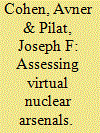

|
|
|
|
|
| Publication |
1998.
|
| Description |
p.129-144
|
|
|
|
|
|
|
|
|
|
|
|
|
|
|
|
| 2 |
ID:
103228
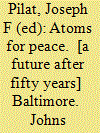

|
|
|
|
|
| Publication |
Baltimore, Johns Hopkins University Press, 2007.
|
| Description |
xix, 364p.
|
| Standard Number |
9780801885617, hbk
|
|
|
|
|
|
|
|
|
|
|
|
Copies: C:1/I:0,R:0,Q:0
Circulation
| Accession# | Call# | Current Location | Status | Policy | Location |
| 055892 | 327.1747/PIL 055892 | Main | On Shelf | General | |
|
|
|
|
| 3 |
ID:
107063
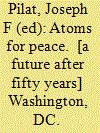

|
|
|
|
|
| Publication |
Washington, DC, Woodrow Wilson Center Press, 2007.
|
| Description |
xix, 364p.
|
| Standard Number |
9780801885617
|
|
|
|
|
|
|
|
|
|
|
|
Copies: C:1/I:0,R:0,Q:0
Circulation
| Accession# | Call# | Current Location | Status | Policy | Location |
| 056207 | 327.1747/PIL 056207 | Main | On Shelf | General | |
|
|
|
|
| 4 |
ID:
119455
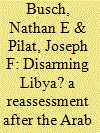

|
|
|
|
|
| Publication |
2013.
|
| Summary/Abstract |
In 2011, several months after a popular revolt overturned the Gaddafi regime in Libya, Libya's new National Transitional Council announced the discovery of what was later confirmed to be an undeclared stockpile of chemical weapons. This was a startling announcement to many observers, since Libya had publicly renounced its weapons of mass destruction (WMD) programmes in 2003 and had apparently dismantled the programmes soon after.
Although the Libyan case had repeatedly been referred to as a positive 'model' for nonproliferation - an instance where a country had voluntarily and peacefully rolled back its WMD programs - this recent discovery forces us to wonder whether the Libyan 'model' really was as successful as initially described.
This article examines the successes, challenges and lessons that can be learned from the Libyan case of WMD renunciation and verification. As one model of cooperative verification, the Libyan case highlights not only the opportunities afforded by monitoring and verification regimes, but also some of the difficulties that any such regime will encounter in real-world circumstances, however positive.
|
|
|
|
|
|
|
|
|
|
|
|
|
|
|
|
| 5 |
ID:
077680
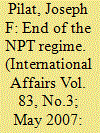

|
|
|
|
|
| Publication |
2007.
|
| Summary/Abstract |
In the context of rising regional instability and conflict, along with increased incidents of global terrorism, in a dynamic, uncertain security environment, emerging nuclear and other weapons of mass destruction threats-both state proliferation and terrorism-are seen as growing dangers giving rise to increasing global insecurity. The international nuclear nonproliferation regime, the centerpiece of which is the Nuclear Non-proliferation Treaty (NPT), is essential to current and future non-proliferation efforts and needs to be maintained and strengthened, not replaced. The normative and legal weight of the regime is important for counterterrorism as well as non-proliferation, but it will not likely directly affect the behaviour of so-called 'rogue states' and terrorists. Preventing them from achieving their objectives if they attempt to wield nuclear and radiological weapons may deter and dissuade them, as may a credible prospect of punishment. The interaction of non-proliferation and deterrence, so clear during the Cold War history of the NPT, remain crucial parts of an increasingly complex picture
|
|
|
|
|
|
|
|
|
|
|
|
|
|
|
|
| 6 |
ID:
087072
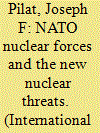

|
|
|
|
|
| Publication |
2008.
|
| Summary/Abstract |
The North Atlantic Treaty Organization's nuclear forces were central to deterence and defence duting the Cold War. Their future role is far less clear in the dramatically changed security environment since its end. Dispite concerns about the long term evolution of Russia and China, the major threats to national and international security today stem not from confrontations between great powers, but from proliferation and terrorism.
|
|
|
|
|
|
|
|
|
|
|
|
|
|
|
|
| 7 |
ID:
004746
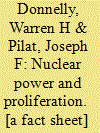

|
|
|
|
|
| Publication |
Washington, Congressional Research Service, Library of Congress, 1983.
|
| Description |
19p.
|
| Series |
CRS Report; no. 83-120
|
|
|
|
|
|
|
|
|
|
|
|
Copies: C:1/I:0,R:0,Q:0
Circulation
| Accession# | Call# | Current Location | Status | Policy | Location |
| 034219 | 355.825119/DON 034219 | Main | On Shelf | General | |
|
|
|
|
| 8 |
ID:
041382
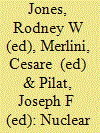

|
|
|
|
|
| Publication |
Lexington, Lexington Books, 1985.
|
| Description |
xv, 253p.
|
| Standard Number |
0669100978
|
|
|
|
|
|
|
|
|
|
|
|
Copies: C:1/I:0,R:0,Q:0
Circulation
| Accession# | Call# | Current Location | Status | Policy | Location |
| 027943 | 338.47621480973/JON 027943 | Main | On Shelf | General | |
|
|
|
|
| 9 |
ID:
060787
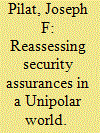

|
|
|
| 10 |
ID:
146630
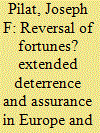

|
|
|
|
|
| Summary/Abstract |
The extended deterrence relationships between the United States and its allies in Europe and East Asia have been critical to regional and global security and stability, as well as to nonproliferation efforts, since the late 1950s. These relationships developed in different regional contexts, and reflect differing cultural, political and military realities in the US allies and their relations with the United States. Although extended deterrence and assurance relations have very different histories, and have to some extent been controversial through the years, there has been a rethinking of these relations in recent years. Many Europeans face a diminished threat situation as well as economic and political pressures on the maintenance of extended deterrence, and are looking at the East Asian relationships, which do not involve forward deployed forces as more attractive than NATO’s risk-and-burden-sharing concepts involving the US nuclear forces deployed in Europe. On the other hand, the East Asian allies are looking favorably at NATO nuclear consultations, and in the case of South Korea, renewed US nuclear deployments (which were ended in 1991), to meet increased security concerns posed by a nuclear North Korea and more assertive China. This paper explores the history of current relationships and the changes that have led the allies to view those of others as more suitable for meeting their current needs.
|
|
|
|
|
|
|
|
|
|
|
|
|
|
|
|
| 11 |
ID:
133993
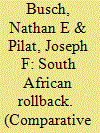

|
|
|
|
|
| Publication |
2014.
|
| Summary/Abstract |
As the only country in history to have created, then voluntarily renounced, a nuclear arsenal, South Africa is often referenced as a potential model for nuclear disarmament. However, this article argues that there are sharp limitations on the extent to which the South African case can be applied as a model for other countries to follow. Because South Africa unilaterally dismantled its program and only brought in inspectors from the International Atomic Energy Agency (IAEA) and key member states after the dismantlement was complete, information vital to the verification process was lost to the international community. As a model of a cooperative verification, South Africa thus highlights both the difficulties that monitoring and verification regimes will encounter, as well as the opportunities that they afford.
|
|
|
|
|
|
|
|
|
|
|
|
|
|
|
|
| 12 |
ID:
106773
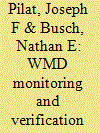

|
|
|
|
|
| Publication |
2011.
|
| Summary/Abstract |
In the years following the 2003 invasion of Iraq, there emerged a generally accepted view that the US government misinterpreted, or even deliberately misconstrued, the intelligence on Iraqi weapons of mass destruction (WMD) and that, in sharp contrast, international monitoring and verification regimes correctly verified prior to the war that Iraq had no WMD and deterred Saddam Hussein from pursuing them. Critiques of international inspections tend to overstate their capabilities and the levels of confidence that inspection processes can give the international community in verifying weapons development and rollback claims. The Iraqi case is important for thinking about current and future monitoring and verification regimes, but important lessons are being overlooked - and the wrong lessons are being learned. A sober reassessment of the strengths and weaknesses of the monitoring and verification in Iraq provides important lessons for those dealing with difficult cases now and in the future.
|
|
|
|
|
|
|
|
|
|
|
|
|
|
|
|
| 13 |
ID:
065668
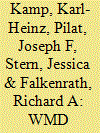

|
|
|
|
|
| Publication |
1998.
|
| Description |
p.168-183
|
|
|
|
|
|
|
|
|
|
|
|
|
|
|
|
|
|
|
|
|